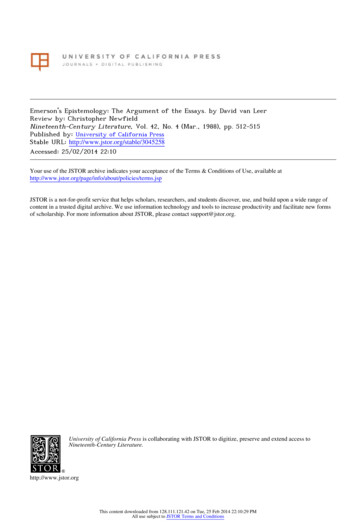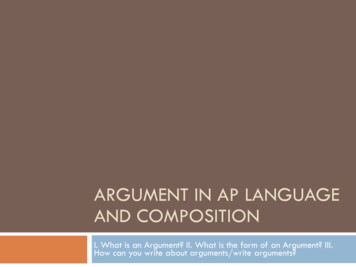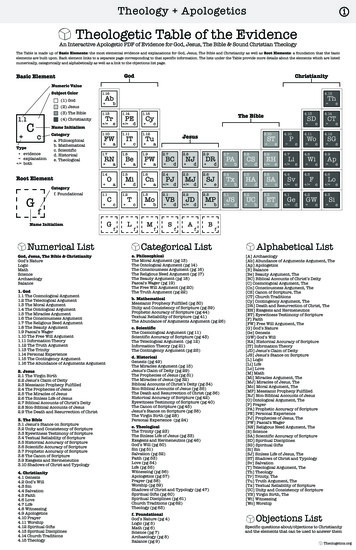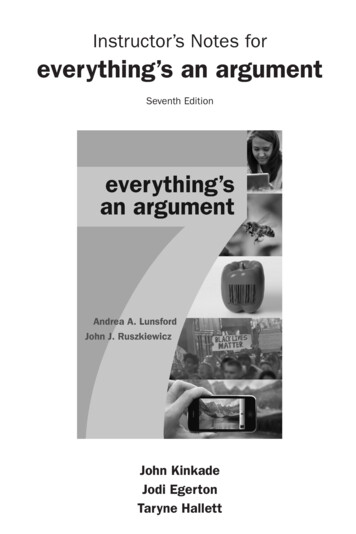
Transcription
Emerson's Epistemology: The Argument of the Essays. by David van LeerReview by: Christopher NewfieldNineteenth-Century Literature, Vol. 42, No. 4 (Mar., 1988), pp. 512-515Published by: University of California PressStable URL: http://www.jstor.org/stable/3045258 .Accessed: 25/02/2014 22:10Your use of the JSTOR archive indicates your acceptance of the Terms & Conditions of Use, available at ms.jsp.JSTOR is a not-for-profit service that helps scholars, researchers, and students discover, use, and build upon a wide range ofcontent in a trusted digital archive. We use information technology and tools to increase productivity and facilitate new formsof scholarship. For more information about JSTOR, please contact support@jstor.org.University of California Press is collaborating with JSTOR to digitize, preserve and extend access toNineteenth-Century Literature.http://www.jstor.orgThis content downloaded from 128.111.121.42 on Tue, 25 Feb 2014 22:10:29 PMAll use subject to JSTOR Terms and Conditions
512NINETEENTH-CENTURYLITERATUREThe claimthatthereis a new Melvillerenaissancemaybe challenged,but the timingof this musteringof forcesis appropriate.The Northwestern-NewberryEdition is grindingon toward completion,and JayLeyda is perseveringwithhis thirdedition of The MelvilleLog. Two biographies have been announced. In the broader field of American litLiteraturethereare also signsthatforcesare being mustered.Americaneratureis full of news about two projected multi-contributorliteraryhistories,LawrenceBuell has a big new literaryhistoryof New England,and KermitVanderbilthas a marvelousaccountof AmericanLiteratureandtheAcademy(1987), the climax of which is the politicsof creatingTheLiteraryHistoryoftheUnitedStates.We can see in workon Melvilleand inthe fieldof Americanliteraturesome genuine consolidatedgains in sophisticationabout history,literaryhistory,biography,thehistoryof scholof variousbranchesof critarship,and the historyand interrelationshipsicism and theory.In the Companioneven the overlappingfromchapterto chapter strikesme not as redundancybut as welcome corroborationthat people are workingtogether,whetherthey workjointly or apart.Repeatedly,the contributorsinfusetheirchapterswitha strongsense ofhow learningreached the presentstage and whatworkneeds to be done.Repeatedly,theycall for . 531) even as theyembodyit in theirown words.And if you aretroubledby uncompanionableskepticismat the thoughtof yet anothercollectionof essays on Melville,rememberthat even the best of theseessays mightnot have been writtenif Bryant'sblandishmentshad notsummoned them forth.HERSHELPARKERUniversityof DelawareD A V I D V A N L E E R. Emerson'sEpistemology:The Argumentof theEssays.Cambridge: Cambridge UniversityPress,1986. Pp. xviii 282. 29.95.David Van Leer findsa place fromwhichhe mightsend Emerson criticismoff in a new direction.He declines to considerEmerson'scorpus as spiritualbiography,as an allegoryof dialecticalselfmaking,as part of a broader culturalhistory,or as "one more version"of the wane and "apocalypticreturnof power" (pp. 135-36). He hasreasons for his lack of interestin "the psychologicalsituationthat ledEmerson to think"a particularthought,for to assume that psychologyThis content downloaded from 128.111.121.42 on Tue, 25 Feb 2014 22:10:29 PMAll use subject to JSTOR Terms and Conditions
513REVIEWSexplains "thought"amountsto "whatwe mightcall the 'lifeof the mind'fallacy"(p. 12). He ignores empirical psychologyin order to considerpsychology'spreconditions,and finds Emerson's major literarycontribution in his analysisof the permanentgrounds of experience ratherthan in his account of experience itself.As Van Leer examines Emersonian categoriessuch as "self,""spirit,""power,"and "fate" withinthe"genre" of epistemology,he illuminatestheirlogical snarls,familyrelations,and unexpected inventions.But to move fromthis new claritytoa significantrevisionof Emerson'scategoriesprovesto be a more difficultmatter.Van Leer argues thatEmerson's work restsfirston a Kantian subtextand later on a "proto-pragmatist"theoryof meaning. Followinganofhisexplanationmethod,his chapterscenteron the establishedmajoressays-Nature, the DivinitySchool "Address,""Self-Reliance,""Experience," and "Montaigne"-in order to liberatethe epistemologicalargumentcouched in the deceptivelyspiritualisticlanguage of the sage. ThusforVan Leer Naturedoes notdescribea quasi-Platonicfaithin theidentityof eternalSpiritand "Man Thinking,"but a far more analytical,Kantianproof of "the extentto whichthe verypossibilityof experience is predicated on the unityof apperceptionor the '1 think'and on the existenceof an objectiverealmapart fromthe apperceptiveunity"(p. 185). "Spirit"is an unnecessarilysupernaturalwayof referringsimplyto the preconditionsof human consciousness.Movingthroughthe "Address"and "Self-Reliance,"Van Leer makesthe case thatEmerson does not wish to fold the self into spiritso muchas to distinguishbetweenthe phenomenalselfand thelogicalself.Emersoncriticismoftenmistakesthe logicalselfforReason or soul, but Emerson'sepistemologicalargumentshows that this irreducible"self" cannot be thefreelywilling,spontaneouslymoral, empiricalperson but only a formal"I think,"a determinatebut emptycategory:"consciousnessis simplyalaw, a prerequisitefor empiricism"(p. 140). Van Leer sees in the ostensibleskepticismof "Experience"not theordinaryfearthatour subjectivitycannot know "things-in-themselves"but the more astringenttruththatcannot knowthe purelylogical selfthatgroundsit. Ordinarysubjectivityskepticismis not only impossiblebut, firmingthatthe selfacquiresstabilitypreciselyfromof its constitutiveparts.the unknowabilityBut having moved Emerson froma religionto an epistemologyofthe self-to a selfwhichis thatwhichknows-has Van Leer also shownthatthe epistemologicalself differsfromthe more familiarself of sublimated religion?It would seem not: in Van Leer's telling,the narrativeof the "preconditions"of experience leads to the same place as did theThis content downloaded from 128.111.121.42 on Tue, 25 Feb 2014 22:10:29 PMAll use subject to JSTOR Terms and Conditions
514NINETEENTH-CENTURYLITERATURErhetoricof the "God within."Van Leer objectsto those predecessorswhotake Emerson'sspiritualisticrhetoricat face value, but he comes close uralnessof belief,"the "unknowablefaith"that"therecan be nothingto be done thatis notis to lead beyondnature"(pp. 199, 205). Epistemology'sessentialtrajectoryitselfinto the kind of belief in the world as an integratedtotalitythatStephen Whichermeant by "naturalism"and thatVan Leer honors withThis pragmaticselfdistinctlyresemblesthethe term"proto-pragmatism."divine self in its faithin a "self-evident"realitythat "simplyhangs togetheron itsown terms"(p. 16). It is notclear thatwe needed speculativeshortjourney fromSwedenborg'scorphilosophyto speed the strikinglyrespondence and Kant's preconditionsto the natural revelationof Emerson's "Blessed Unity,"which, in Van Leer's more "epistemological"mood, he would have treated as an eloquent spiritualistidiom veilingEmerson'smore sophisticatedclaims (p. 205).Still,does Van Leer's unexpected agreementwithhis predecessorsshow that he is mistaken?Is he not in factcorrectto see Emerson ultimatelypreachingnot merely"negativelimits"but the holisticassurancethatwe can neverbe outside our constitutivesystem?I mentiontwo reasons for thinkingthat Van Leer's explicitconclusionsare wrong. First,ratherthanhe achieveshis is earlierreadingof Kant. His reassertionof nature'stotalityand the self'sunityrestson the illegitimatetranslationof the purely"formal" "unknowable"selfintoa phenomenal,experiencedself,a translationthat recapitulatesColeridge's woefullyinfluentialdisregard for Kant'sand thatVan Leer deplores in thequalificationsof the "transcendental,"Kantandhis claimthatthe transcendentalrefinesory.obsessivelyrepeatslaw is nota "psychologicalproperty,"and that it cannot be experiencedas an "object of intuition."Van Leer allows harmonybetweenself andworld only by forgettingthat Emerson's Kantian insightabout the selfregards it as dividedbetweenits "logic,"which entails the "unityof apperception,"and its experience,which involvesunity'sperpetual disappearance.deviatesfromhis own holismandSecondly,Van Leer intermittentlyhintsat makingdivisioninto Emerson's greatestinsight.At these timeshe offersindispensiblehintsabout the presentlyunknowndestinationofEmerson's "Cartesian schizophrenia"(p. 184). This more exacting VanLeer stressesthe "'exclusion' that the livingfeel fromthe absolute [offormalpreconditions,which]. resultsin the totalfragmentationof experience"(p. 171). Fragmentationdoes not suggestthe self's"fictionality"or the returnof unityon a differentlevel so much as it suggeststhe self'sdependence on "a tension between experience and its presuppositionsThis content downloaded from 128.111.121.42 on Tue, 25 Feb 2014 22:10:29 PMAll use subject to JSTOR Terms and Conditions
515REVIEWSthat logicallyrequires a simultaneousunityand duality"(p. 184). TheforgetfulVan Leer, who wishesto fitEmerson to a residuallyspiritualistidealism,claims that "transcendentprivacy"is the feltconditionof existence; the analyticalVan Leer, who wishes to fitidealism to Emersonhimself,suggeststhatthisprivacyis "logicallyunexperienceable"(p. 177).Subjectivity,in the second case, does not reston the priorityof thoughtto thingsbut on the waythings"rush out of [thought]to be incarnatedas people" (p. 192). This subjectivitydoes not depend on the self'sunityand substancebut on some entitiesthatVan Leer alternatelyinvokesandabandons-"webs of relations,""rotationor mere change" (p. 192), and"other persons"as "incarnations"of things.These more dispersed and uninternalized"lords of life" lie at thecenterof what futurereaders of Emerson will show to be his most enIt is a tribduringcontribution:a complex psychologyof non-autonomy.hewill requireute to the difficultpromise of Van Leer's materialthatthe help of futurecriticsto explain his more unprecedentedfindings.CHRISTOPHERNEWFIELDRice lBiography.New York: St. Martin'sPress, 1986. Pp. xvi 217. 25.If the name of MargaretOliphantis missingfromthe index of Silences,Tillie Olsen's studyof writersthwartedby circumstance,we can perhaps attributethis to her 125 books and countlessarticles.From the age of twenty,when she wroteher firstpublishednovel,to her death at sixty-nine,she was drivenby circumstance,not having(asshe put it) "the luxuryof keeping quiet" (p. 27). Even in her sixtiessheworked on two three-deckernovels at once, producingon average, accordingto MerrynWilliams,"a volumeeverysixteendays" (p. 171). Likeher productivity,her range was legendary.Her fictionembraces everygenre popular withher ances,novels of social realism,consolationbooks, religiousmeditations,rural fiction,ghost stories,and children'sbooks. Her twenty-fivenon-fictionbooks include laccounts,and an autobiography.Despite her mediocreFrench,shetranslatedthe seven volumesof Montalembert'sLes Moinesd'OccidentforJohn Blackwood.(When the authorgroused about the translationin vol-This content downloaded from 128.111.121.42 on Tue, 25 Feb 2014 22:10:29 PMAll use subject to JSTOR Terms and Conditions
Emerson to think" a particular thought, for to assume that psychology This content downloaded from 128.111.121.42 on Tue, 25 Feb 2014 22:10:29 PM All use subject to JSTOR Terms and Conditions. . his chapters center on the established major essays-Nature, the Divinity School "Address," "Self-Reliance," "Experi-










